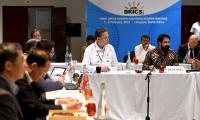BRICS expansion: what does it mean for democracy?
BRICS, led by China, has gained five new members as of January 1, 2024. But rather than consolidating the group, the BRICS expansion will only reduce the little cohesion there was. And the question remains: will the expansion create even greater competition for leadership in the Global South?

South Africa hosts First BRICS meeting in 2023 in Bela-Bela
Peter Marcus Kristensen, Associate Professor at the Department of Political Science, University of Copenhagen.

After a number of years without much media attention, BRICS - originally made up of Brazil, Russia, India, China, and South Africa - announced in August that it would be expanding with new members. Reportedly, BRICS had received applications or expressions of interest from up to 30 potential member countries.
In the end, only six applicants were offered membership: Argentina, Egypt, Ethiopia, the United Arab Emirates, Iran, and Saudi Arabia. However, since Javier Milei came to power in December, Argentina has withdrawn its membership.
The battle for the global south
The BRICS expansion received special attention as it feeds the fear that the West has "lost" the Global South. On top of that, to an autocratic axis or even an anti-Western alliance dominated by China and Russia.
China and Russia have a particular interest in this analysis. Chinese Foreign Ministry spokesperson Mao Ning stated before the expansion that China was ready to admit "like-minded partners into the BRICS family." The expansion was, by many, interpreted as a victory for China. However, the picture is not quite so clear-cut, as the BRICS are, and always have been, a colourful bunch.
The admission requirements
By now, it is clear to anyone looking through the membership list that the BRICS group does not have democracy, rule of law, or protection of human rights as entry criteria.
At the same time, the group does not exclude countries such as Argentina, South Africa, Brazil, and India, which do, after all, hold free elections. The group therefore contains countries that range quite widely on, for example, Freedom House's democracy ranking.
However, it should be mentioned that one of the reasons why Argentina ended up withdrawing its application is that the newly elected Milei, according to his own statement, does not "do business with communists" (like Brazil's Lula da Silva and China's Xi Jinping).
Absence of economic relations
The economic criteria are not clear either, neither in terms of size, growth, or organisation.
BRICS started out as BRIC, an acronym created by Jim O'Neill of Goldman Sachs to capture the four emerging economies of Brazil, Russia, India, and China. But there is not much economic coherence in the group anymore. Not all members have high economic growth.
The economies of Brazil, Argentina, and Russia have even experienced negative growth over the past decade. Overall, the BRICS now account for about 36% of global GDP in purchasing power parity terms, but China accounts for over half and the five new members only about 5%.
If growth or total GDP were key criteria, one wonders why the BRICS did not include Mexico or Indonesia, whose GDP is far larger than that of the Emirates or Ethiopia.
De-dollarisation
One of the things that unites the BRICS economically is the wish to reform of the international financial architecture. The BRICS have long sought to change voting rights within the World Bank and the International Monetary Fund, IMF.
Lately, 'de-dollarisation' has been their mantra. Officially, because the BRICS is working towards a more multipolar world where one state (and its currency) is not hegemonic.
But rather than an actual vision for an alternative financial system, it seems to be primarily because the status of the dollar gives the US control over the global financial system and payment systems such as SWIFT, which is inconvenient for states that are subject to US sanctions - especially Iran and Russia and, in the long term, potentially also China.
However, an actual BRICS currency is still far off on the horizon, and with the European currency cooperation in mind, it is more than difficult to see how countries with such different political and economic systems as the BRICS members could make it work.
No geopolitical confrontation
The BRICS are not exactly like-minded in terms of security policy either. China, Russia, and Iran are geopolitical rivals of the US, while Egypt, Saudi Arabia, and the United Arab Emirates have close security ties with the US.
The BRICS may be portrayed as the symbol of the transition to a more 'multipolar' world order with many regional centres of power and where the West must adjust to being an equal player among many others. But not everyone wishes to get rid of the liberal international order.
Several BRICS members do not want to 'choose sides' between either a Russia-China axis or the West. Brazil in particular has emphasised that the BRICS is not an alternative but a supplement to other groupings, such as the G7.
Internal rivalries
Tensions within the group are also easy to spot. India and China are geopolitical rivals involved in a more than 60-year-old land border dispute and a maritime competition to dominate the Indo-Pacific region.
Iran and Saudi Arabia have historically been regional rivals, despite recent Chinese-mediated rapprochement.
Egypt and Ethiopia are involved in a conflict over the damming of the Nile despite an ongoing attempt to reach negotiations, and Brazil and Argentina have long competed to be the natural regional leaders in South America.
Rather than consolidating the group, the BRICS expansion will only weaken the little cohesion there was. Since the last meeting, the BRICS group and several of its members have sought to represent themselves as the unified voice of the Global South in international politics. But rather than a consolidated voice of the global south, the BRICS are likely to become a forum for disagreement and competition in the region.